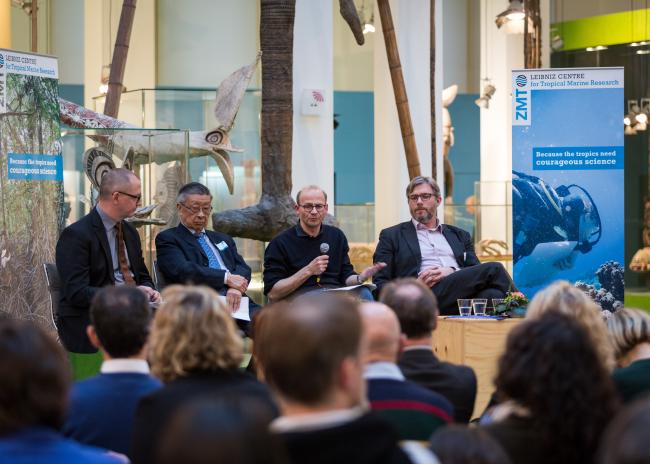Dieser Text ist zur Zeit nur auf Englisch verfügbar...
The subject of governance of oceanic systems and coastlines is moving into the center of European strategic and sustainability interests. Yet, it suffers from a high degree of fragmentation and the lack of a cross-scalar approach to addressing prevailing policy shortcomings. The COST Action “Ocean Governance for Sustainability – Challenges, Options and the Role of Science” comprises a unique, transdisciplinary network of 29 EU countries.
The network aims to establish an integrative vision, and a series of approaches that informs research and future policy directions on crosscutting sustainability-driven issues related to the fragmented governance framework of oceans, seas and coastlines within regional waters, and the open ocean in areas beyond national jurisdiction. The network differs from thematic predecessors in two distinct ways: While attending to the multiple flows and connectivities between varied marine systems together with land-and sea-based interfaces that are biologically, culturally, politically and socio-economically entwined, it first renders equal importance to strengthening regional and interdisciplinary dialogue, producing scientific output, crosscutting the natural and social sciences.
Synergistic issue – driven working groups have been created at a time when Europe is considering its role in global ocean governance, and will continue to evolve well after the COST Action OceanGov ends. The network creates a distinct multi-scalar and cross-sectoral platform for institutional partners across academia, policymaking and civil society, presenting inclusive spaces for transdisciplinary dialogue, capacity development and the advancement of practical toolkits that attend to science – policy gaps inherent within integrated ocean and coastal governance.
Objectives
1. To assess priority issues that affect the governance of oceans and coastlines
2. To map and analyze the current institutional governance architecture in its fragmented and sustainability-challenged form
3. To develop governance theoretical and empirical evidence to enhance ocean sustainability by improving ocean related decision-making.
Administrative project coordinator and grant holder manager
Bianca Hurlemann
Phone: +49 (421) 23800 - 153
Email:
OceanGoc website
COST Association website
Project Partners (Germany) |
International Project Partners | |
|---|---|---|
|
Leibniz Centre for Tropical Marine Research (ZMT) University of Bremen Institute for Advanced Sustainability Studies in Potsdam Jacobs University Bremen- University of Kiel German Marine Research Consortium (Office Brussels) |
Institute for Sustainable Development and International Relations (IDDRI), France Universidad del La Laguna, Tenerife, Spain Istanbul Bilgi University, Turkey Durham University, UK University of Amsterdam, Netherlands Cyprus University of Technology, Cyprus Aalborg University, Denmark IFREMER, France Trinity College Dublin, Ireland Technion - Israel Institute of Technology Università di Milano-Bicocca, Italy Wageningen University, Netherlands University of Groningen, Netherlands VU University of Amsterdam, Netherlands Interdisciplinary Centre of Marine and Environmental Research, Portugal National Institute of Biology, Slovenia Universitat Autonoma Barcelona, Spain Stockholm Resilience Centre, Sweden University of Lucerne, Switzerland University of Liverpool, UK University of the Azores, Portugal University Santiago de Compostela, Spain Open University, Raoul Beunen CEDIS - Centro de Investigacao e Desenvolvimento sobre Direito e Sociedade, Portugal Future Ocean Alliance, Portugal Lund University, Sweden Queen´s University Belfast, UK Ghent University, Belgium Universidad de Sevilla, Spain Hellenic Centre for Marine Research, Greece University of Bucharest, Romania Josip Juraj Strossmayer University, Kroatia University College Cork, Ireland Lisode, France |





